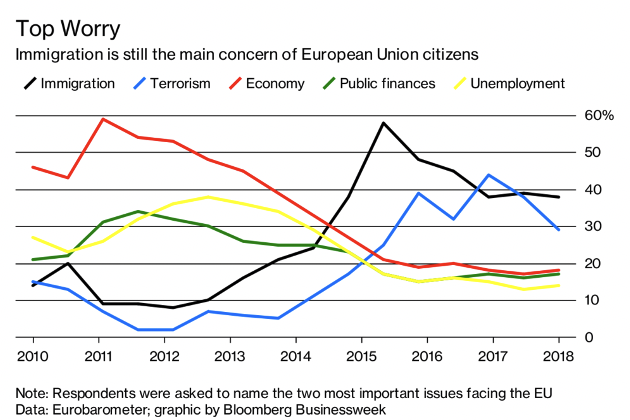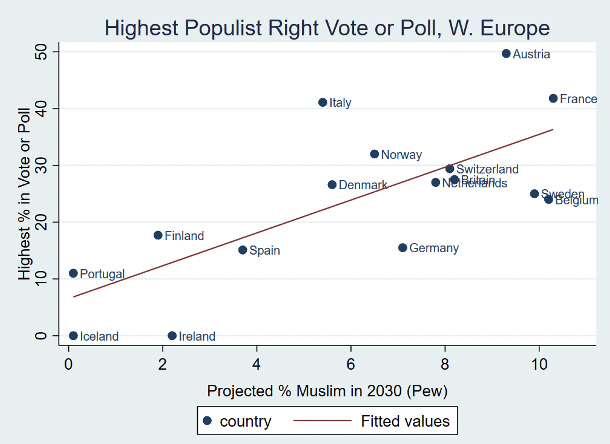The results of the French election showed a resounding Macron victory. Yet Marine Le Pen increased her share of the vote in the final runoff from 34% in 2017 to 42% in 2021. This score in turn dwarfed her father’s shocking 18% performance in 2002 which brought a million demonstrators out on the streets. Though Macron suffered from incumbency and a weak economy, he benefited from the fact that many of the issues that favour national populism were in abeyance.
For instance, research shows that when immigration is a high-ranking priority for voters, national populist parties benefit. On issues where people trust technocratic expertise, such as foreign policy, combatting Covid or managing the economy, fewer voters look to populists. These issues tend not to be prioritised by populist voters, nor do they predict populist voting. Populists attempting to seize on the Covid issue have fallen flat.
As the figure below shows, when the economy is performing well and foreign policy questions or Covid are not dominating the headlines, technocratic mainstream parties are less advantaged and there is more room for the rise of cultural issues that favour Right-wing populism. Prior to the populist moment of 2014-17 in Europe and America, economic questions had declined in importance among voters.
On this view, Le Pen could have come closer (as Norbert Höfer did in Austria in 2016), perhaps even scoring an upset, had circumstances been similar to those of 2015.

The deeper structural drivers of national populism, whether with Trump, Brexit or Le Pen, lie in ethnic majority discomfort with the scale and pace of cultural change, supplemented by concerns over the integration of Muslims (though this is not the main factor). Culture war questions over the boundaries of free speech and content of national history are adding another layer to political contestation in American politics, and this could also begin to affect European politics.
This said, national populism’s potential is limited by a ceiling of strongly motivated opposition. The only question is whether this limit lies above or below the 50% mark. One way of getting a sense for where the potential lies is to examine the relationship between ethno-demographic scale and change, as indicated by Pew’s projected Muslim share of a West European country in 2030, and the high-water mark of support for the populist Right.
Why do this? National populist parties rely on charismatic leaders more than party brands. When the Freedom Party lost Jorg Haider, or Nigel Farage left UKIP, support for their parties sagged. Yet these parties can rise as quickly as they fall, so it is important to have a sense of their potential vote: the maximum share of the population that might support them if the right leader or set of political conditions were to emerge.
This number will clearly be higher in a 2-person runoff system like Austria or France than in a vote or poll where there are many options to choose from. Still, the highest performance is an indicator of how powerful national populism’s appeal is in a country and the strength of its taboos against Right populists. I omit Eastern Europe because national populism has different sources and dynamics there, rooted in a divergent historical experience.

The picture above, as with similar analyses, reveals an important .49 correlation between my measure of populist Right potential and Pew’s projected 2030 Muslim share, a proxy for ethno-demographic change.
What is more difficult to determine is whether the electoral ceiling for the populist Right will continue to rise as Europe’s ethnic majority declines, or whether cultural and psychological Left-liberalism, material interests or generational value change set a firm upper bound to populist success.











Join the discussion
Join like minded readers that support our journalism by becoming a paid subscriber
To join the discussion in the comments, become a paid subscriber.
Join like minded readers that support our journalism, read unlimited articles and enjoy other subscriber-only benefits.
Subscribe